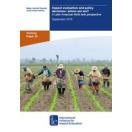
Impact evaluation and policy decisions: where are we? A Latin American think tank perspective
3ie Working Paper 24
This paper by Jaramillo and Alcázar addresses questions that go to the heart of impact evaluation research: how much has the field achieved towards its goal of informing public policies, and which factors may have been furthering or hindering this goal?
Looking primarily at its own experience, a Peruvian think tank, the Group for the Analysis of Development, elucidates the importance of factors such as the researcher’s contact with programme officers, methodological choices, external validity, institutional factors and public sector capacity, which may all play a role in making impact evaluation results more effective or less effective in informing policy decisions.
The authors find a common perception among researchers: it is not enough to try to persuade public officials about the usefulness of an impact evaluation or to find ingenious ways to get the evaluation done. The keys are to institutionalise learning systems in which impact evaluations play an important role and to establish mechanisms that make their use mandatory, through an entity with authority and suitable capacities to do so. Recent experiences in Latin America suggest that the time is ripe for this type of institutional development.




